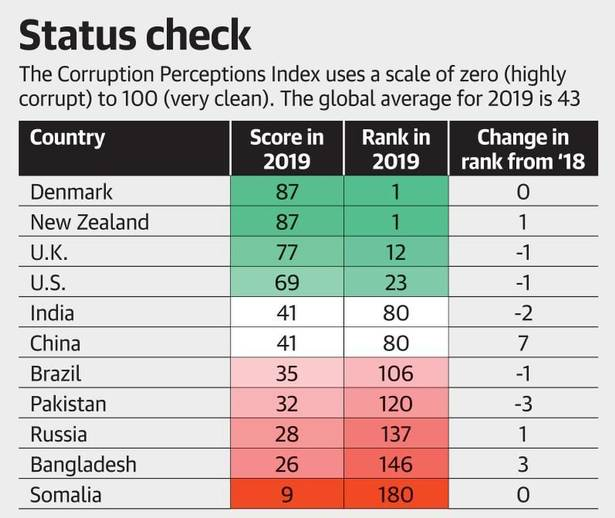Governance
Corruption Perceptions Index 2019: Transparency International
- 24 Jan 2020
- 4 min read
Why in News
India’s ranking in the Corruption Perceptions Index (CPI-2019) has slipped from 78 to 80 compared to the year 2018.
- The 2019 CPI draws on 13 surveys and expert assessments to measure public sector corruption in 180 countries and territories, giving each a score from zero (highly corrupt) to 100 (very clean).
- First launched in 1995 by the Transparency International, the Index has been widely credited with putting the issue of corruption on the international policy agenda.
- Transparency International is a non-profit, non-governmental organisation dedicated to fighting corruption. It was founded in 1993 and is based in Berlin, Germany.
Key Points
- Global Status
- A majority of countries are showing little to no improvement in tackling corruption.
- In the last eight years, only 22 countries significantly improved their CPI scores, including Greece, Guyana and Estonia. In the same period, among the 21 countries that saw a significant fall in their scores are Canada, Australia and Nicaragua.
- In the remaining 137 countries, the levels of corruption show little to no change.
- Corruption is more pervasive in countries where money can flow freely into electoral campaigns and where governments only listen to the voices of wealthy or well-connected individuals.
- The vibrant economic powers like China (41), Indonesia (40), Vietnam (37), the Philippines (34) and others continue to struggle to tackle corruption. The reasons include keeping decision-making out of public scrutiny and silencing dissenting voices.
- A majority of countries are showing little to no improvement in tackling corruption.
- Top Rankers
- New Zealand and Denmark, with scores of 87 each, followed by Finland (86), Singapore (85), Sweden (85) and Switzerland (85).
- Bottom Rankers
- The countries ranked at the bottom of the list are Somalia, South Sudan and Syria with scores of 9, 12 and 13 respectively.
- Asia-Pacific Region
- In 2019 Index, the average score is 45 (marginally better than the global average of 43), after many consecutive years of an average score of 44, which “illustrates general stagnation” across the region.
- Despite the presence of high performers like New Zealand (87), Singapore (85), Australia (77), Hong Kong (76) and Japan (73), the Asia Pacific region hasn’t witnessed substantial progress in anti-corruption efforts or results.
- Low performers like Afghanistan (16), North Korea (17) and Cambodia (20) continue to highlight serious challenges in the region.
- China has improved its position from 87 to 80 with a score of 41 out of 100 (same as that of India).
- India’s Performance
- India’s score of 41 out of 100 remains the same as that in 2018. It has been ranked at number 80.
- In democracies like India, unfair and opaque political financing, undue influence in decision-making and lobbying by powerful corporate interest groups, has resulted in stagnation or decline in the control of corruption.
Way Forward
- Transparency International has recommended a series of measures to combat rising corruption across the world. Following are the recommendations:
- Manage conflicts of interest.
- Control political financing.
- Strengthen electoral integrity.
- Regulate lobbying activities.
- Empower citizens.
- Tackle preferential treatment.
- Reinforce checks and balances.




